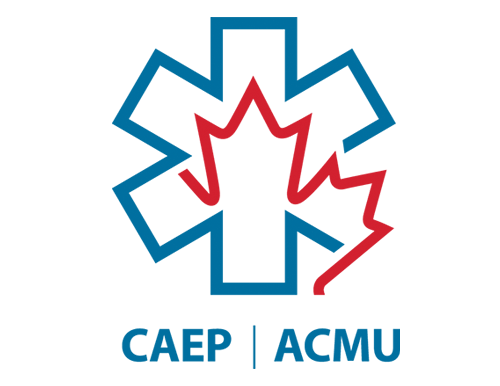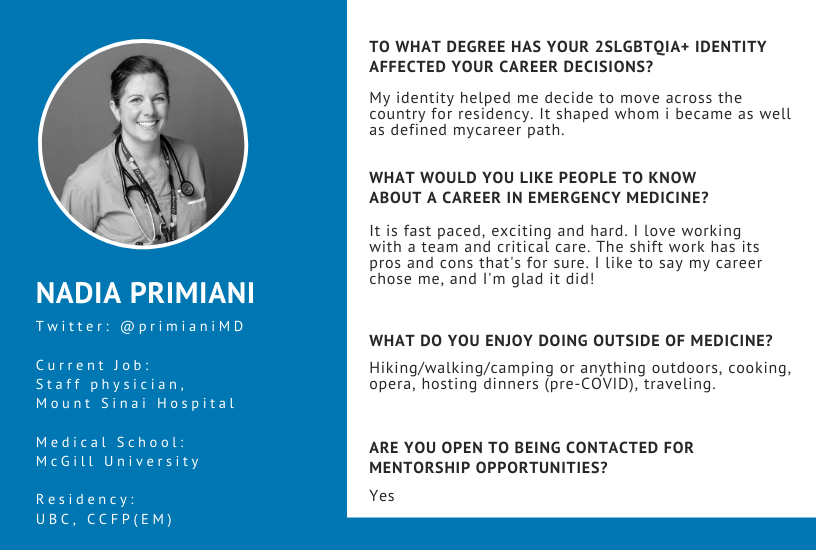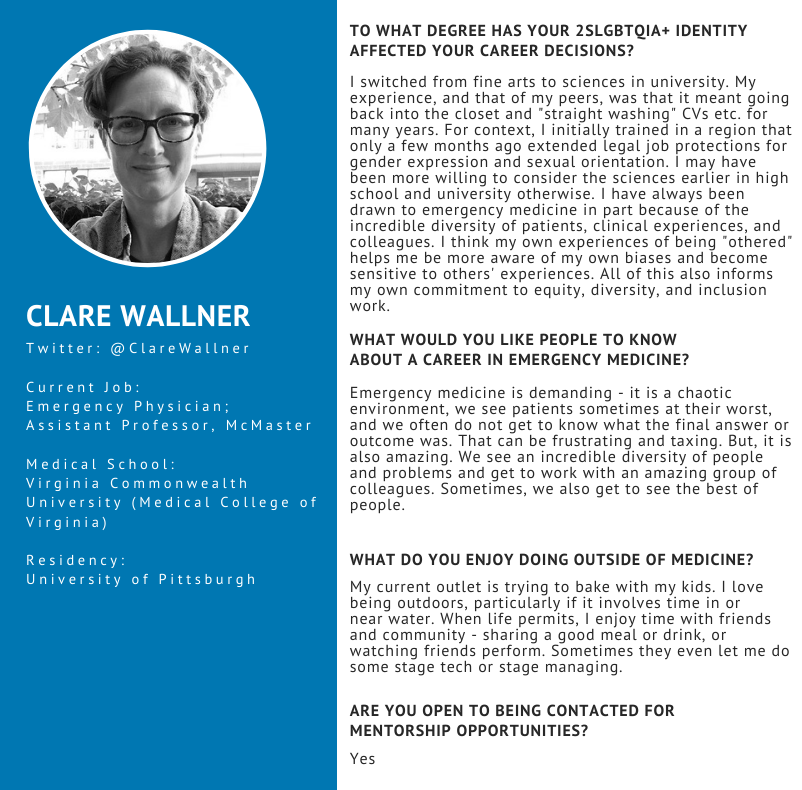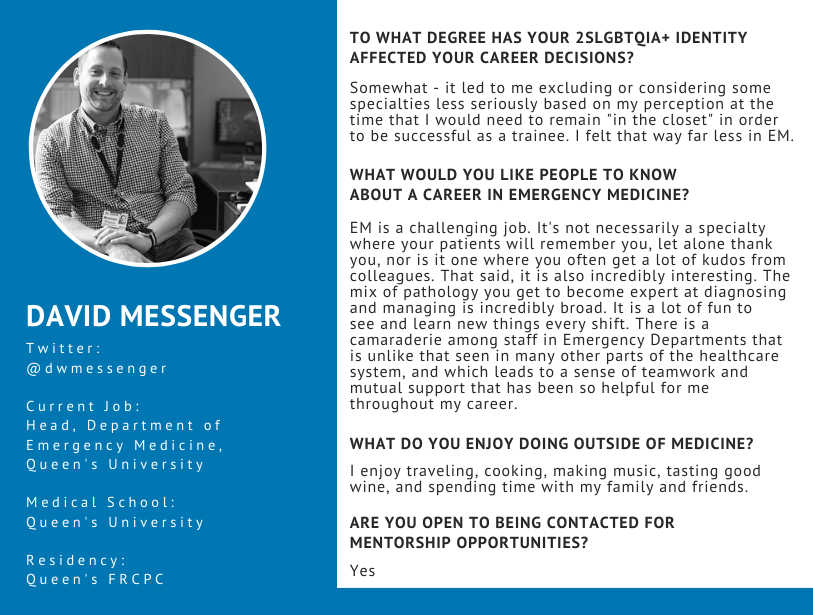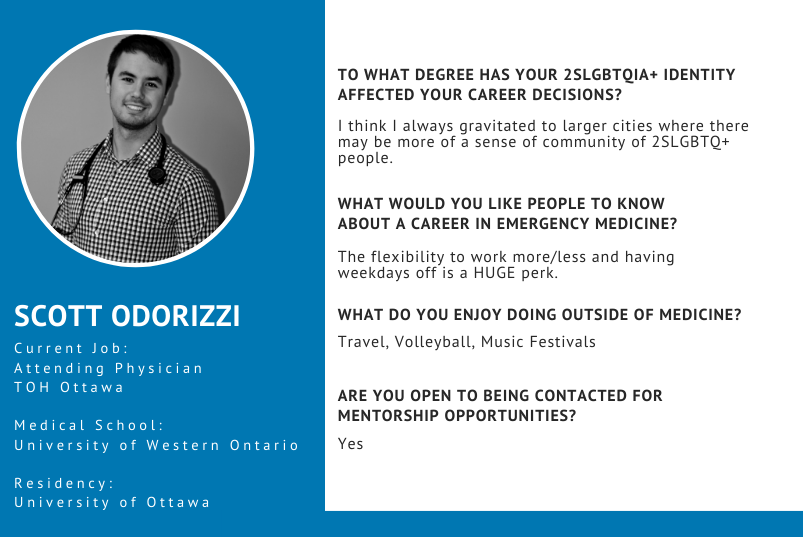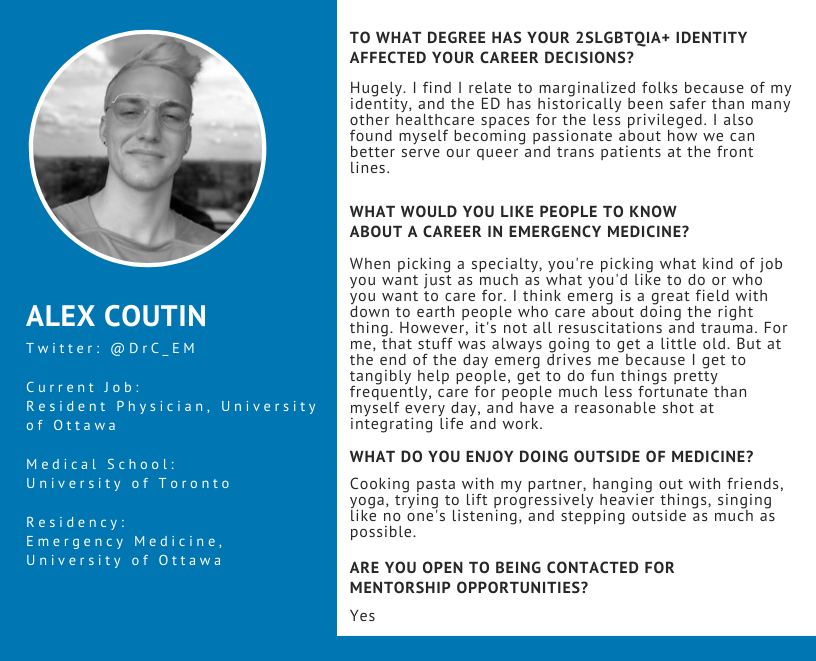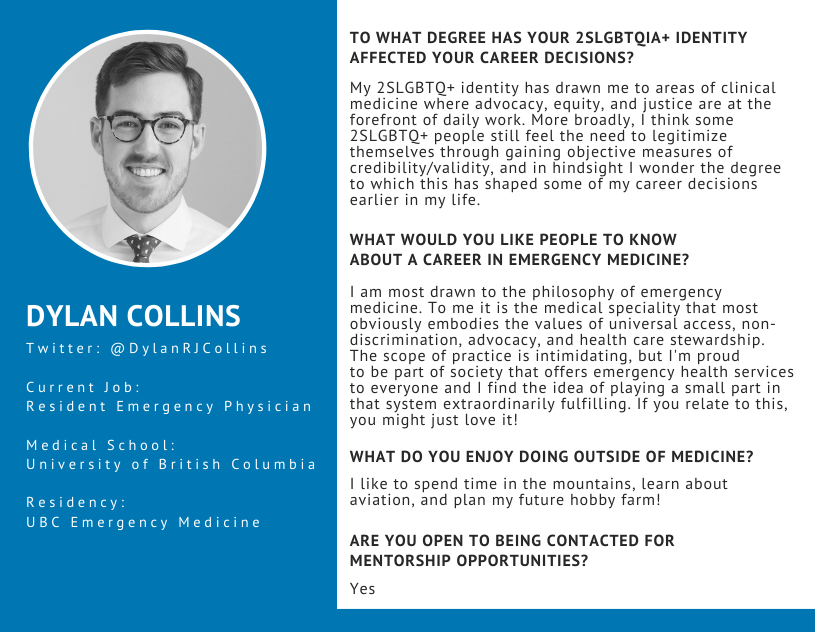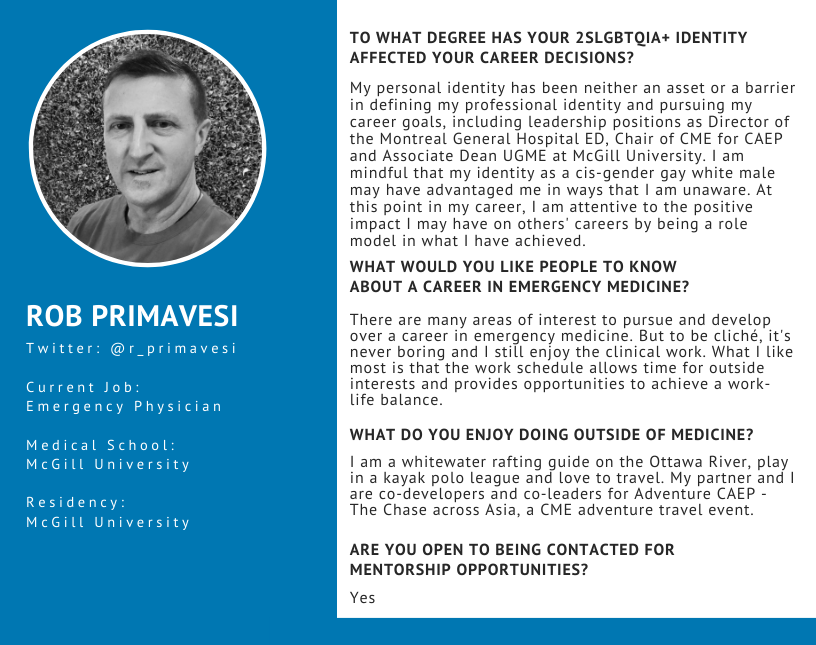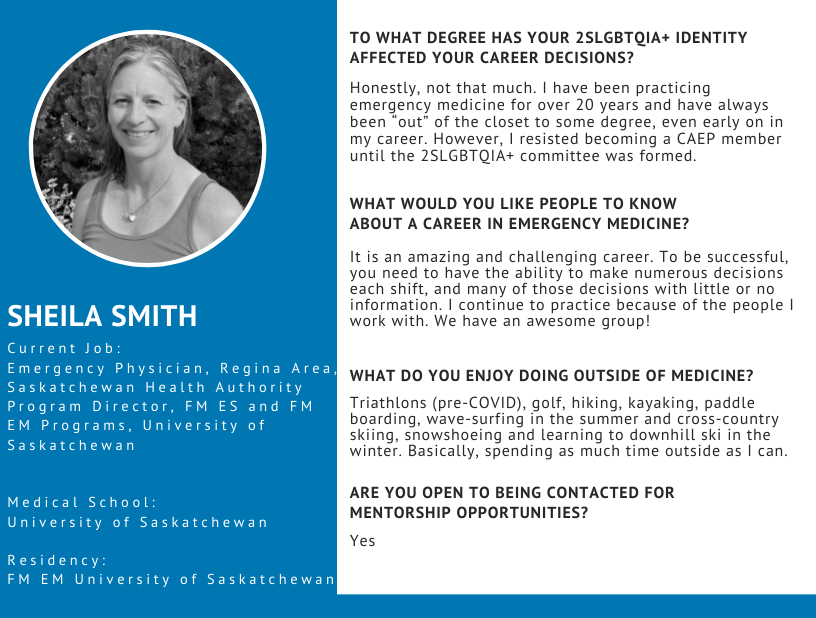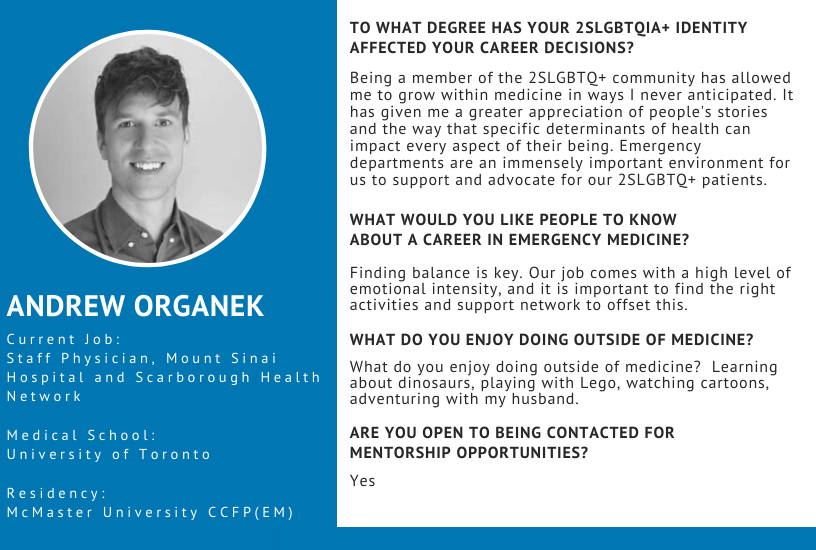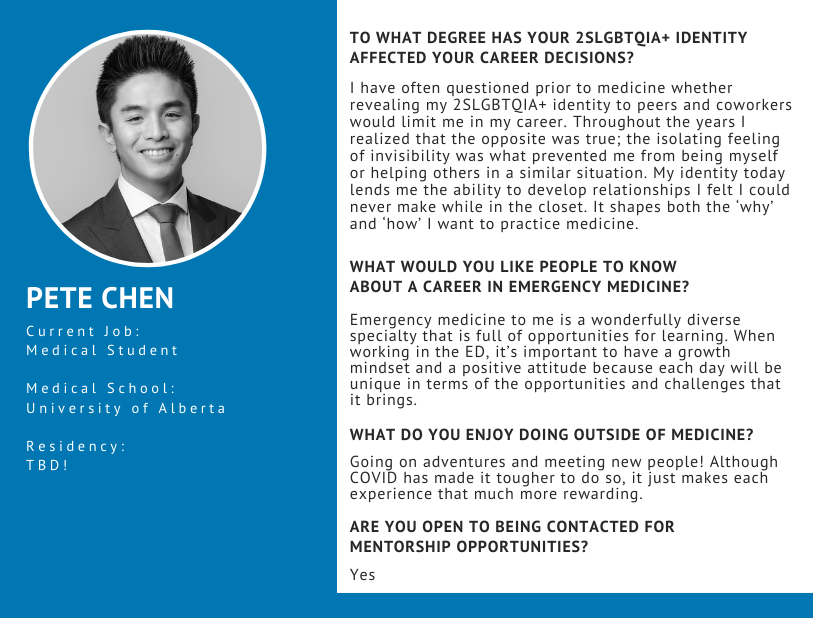The purpose of the project is to increase the visibility of 2SLGBTQIA+ individuals in the field of emergency medicine, with a view of inspiring those from the 2SLGBTQIA+ community to consider a career in emergency medicine and to foster a greater sense of community and allyship within the field. If you’d like to participate in the project, you can fill out a short biography here.
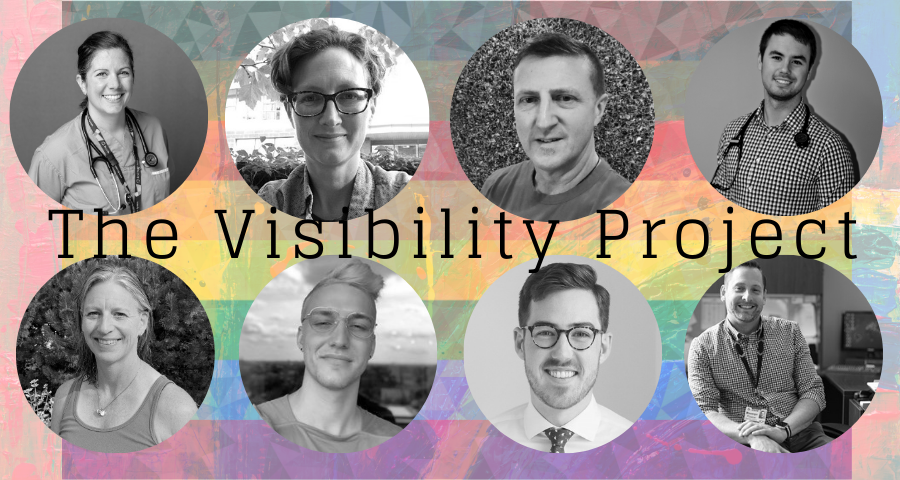
Pronouns: He/Him/His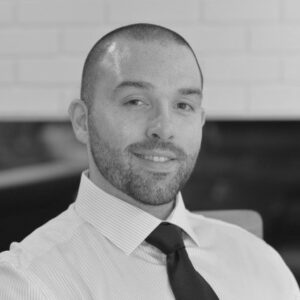
Medical School: University of Manitoba
Residency Training: University of Manitoba
Fellowships: Critical Care Medicine
Area/Location/Department/University association of Practice: University of Manitoba
What drew you to Emergency Medicine as a learner?
First it was resuscitation. There are few things that beat the exhilaration of using your hard-earned skills to fight imminent death. Second, was the challenge of sorting through a diagnostic dilemma. Every case has unique twists and turns that require your full engagement.
What lessons have you found particularly useful through your training and practice?
I’d say skills of critical appraisal are the most important ones I’ve learned. Whether you’re evaluating a published study, receiving handover from a colleague or taking a history from a patient… ensuring that the information you receive makes sense with everything else you know, and seeking to resolve discrepancies if they arise is this single most important skill for an emergency medicine specialist physician.
How do you feel your identity (2SLGBTQIA+ or otherwise) has influenced your career decisions?
I feel lucky to work and have been trained in a location and a micro-culture where my identity was welcomed. I never felt it was a barrier limiting me to a certain pathway. My work in 2SLGBTQIA+ advocacy really started in earnest after my clinical and research training. For anyone considering whether they can incorporate their 2SLGBTQIA+ identity into their clinical and academic careers from the very beginning – you can!
What are your interests outside of medicine?
Acknowledging that I’m a workaholic my favourite things to do outside medicine are to hangout with my family, travel with my partner, and practice my Greek. Efharisto poli!
Describe the impact of the work you do in Emergency Medicine on your community and marginalized groups:
Sexual orientation and gender identity diverse folks continue to face many inequities in our health system. I am leading a program of research with a focus on further understanding and mitigating these inequities. As the Chair of the CAEP Sexual Orientation and Gender Identity Committee I am hoping to use our platform as our national physician specialty organization to advocate for change. Keep an eye out for our forthcoming CAEP Position Statement on Sexual Orientation and Gender Identity Advocacy Services in Emergency Departments.
Is there any advice you would you give specific to a 2SLGBTQIA+ identifying medical student considering emergency medicine as a specialty relating to their career and their 2SLGBTQIA+ identity?
I would ask that you bring your talents and unique life experiences to a specialty that will welcome and celebrate you. In emergency medicine diversity is a strength and we want you!
Is there any advice you would give specific to a 2SLGTBQIA+ identifying resident in an emergency medicine training program relating to their career and their 2SLGBTQIA+ identity?
You have a unique combination of social identities. On one side you hold the power and privilege that comes with being an embedded member of the health system. On the other, you are a member of a group that experiences systemic oppression and marginalization. Consider how these identities interact with the many other multitudes that you contain to inform your priorities and goals as you journey through your training. If you walk your path with consideration and intention I believe you will find it to be most rewarding.
Are you open to be contacted for mentorship?
Yes
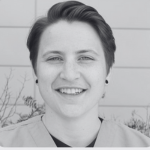 Pronouns: She/her
Pronouns: She/herSocial Media Accounts:
Twitter: a_marcottee
Facebook: Audrey Marcotte
Instagram: @audstick
Linkedin: Audrey Marcotte
Medical School: McGill University
Residency Training: McGill University
Fellowships: Candidate MSc Healthcare Quality, Queen’s University
Area/Location/Department/University association of Practice: McGill University Health Center, Montreal, Quebec
What drew you to Emergency Medicine as a learner?
The ability of EM physicians to seemingly slow down time with an organized approach to chaos really intrigued me. But it was the lively practice environment, team dynamics, and opportunity for advocacy in the ED (it is often the only window into the healthcare system for people) that really held me captive.
What lessons have you found particularly useful through your training and practice?
We never stop learning. Emergency medicine will humble you time and time again.
Who or what has been your biggest motivator?
Knowing that I have the power to potentially make the worst day of someone’s life a little less bad.
How do you feel your identity (2SLGBTQIA+ or otherwise) has influenced your career decisions?
I am not sure that my identity as a masculine presenting CIS-gender lesbian has impacted my career decisions. However, my own lived experience has informed me regarding the way I (as a patient) might want to be seen, heard, and perceived when I enter an emergency room. It has inspired me to share my experience with others in the field.
What are your interests outside of medicine?
I love experiencing music with my partner – she sings, I play guitar, and I just started piano lessons. I also like to run and play rugby, read, and travel (exploring local restaurants/wine is always a treat).
Describe one of your biggest wins:
Training for and running a marathon independently during the first wave of the COVID-19 when races got cancelled, just because it’s something I always wanted to do.
Describe one of your biggest challenges:
Negotiating culture change in a department that is used to doing things in a certain way.
Describe the impact of the work you do in Emergency Medicine on your community and marginalized groups:
Patients, learners, and staff of all backgrounds and identities deserve to be seen, understood and cared for. I hope to contribute to my local residency curriculum and quality improvement committee to make our department a safe and welcoming space for all.
Is there any advice you would you give specific to a 2SLGBTQIA+ identifying medical student considering emergency medicine as a specialty relating to their career and their 2SLGBTQIA+ identity?
Emergency medicine is an extremely rewarding career and has always been at the forefront for social progress. We are learning more and more that diversity is our strength – as resuscitation team leaders, faculty lecturers, and administrators. Representation takes time, and a career in emergency medicine may be your call to lend your voice. However, it also doesn’t fall on you to be the educator of ignorance. Wear your identity with pride: if a residency program does not demonstrate their willingness to celebrate, support, and learn from your identity, then they don’t deserve your hard work.
Is there any advice you would give specific to a 2SLGTBQIA+ identifying resident in an emergency medicine training program relating to their career and their 2SLGBTQIA+ identity?
Identities evolve over time. Throughout residency, you will develop your professional identity through the lens of emergency medicine. You’ll explore and push the limits of your knowledge, efficiency, patience, and resilience. These may be juxtaposed with new responsibilities, emotions, relationships, and maturation of self-expression and understanding. Enjoy the milestones and explore what motivates you – not what you think people want from you. EM is the place to build connections – it will always be the home to diversity in practice, skill, and identity.
Are you open to be contacted for mentorship?
Yes
